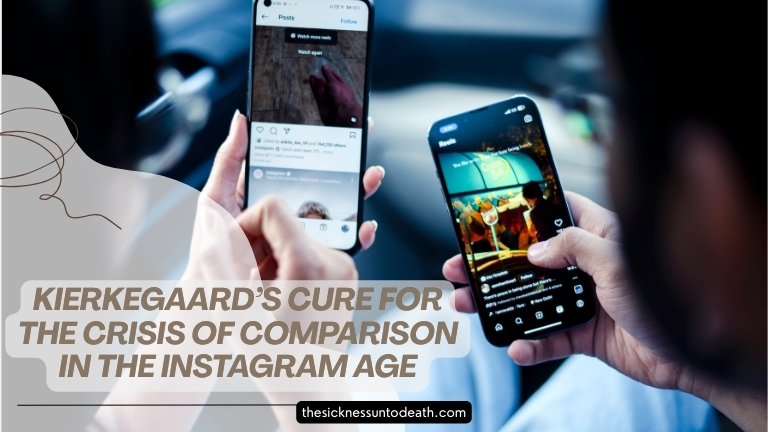Examine Kierkegaard’s rejection of comparison and envy as tools for cultivating a more grounded and faithful life.
We live in a world where we’re constantly invited to compare. Scroll through Instagram and you’ll see it—perfect homes, perfect bodies, perfect holidays, perfect lives. Even when we know it’s filtered, curated, and posed, it still stings. It still makes us question: Am I enough?
For many, the result is quiet despair. Not always loud or dramatic—but a constant undercurrent of inadequacy. And yet, this crisis isn’t new.
Søren Kierkegaard, the 19th-century Danish philosopher, saw it coming. Long before social media, he warned of the spiritual damage caused by comparison—and offered a radically different way of living: one rooted not in envy, but in faith, inwardness, and authenticity.
The Trap of Comparison
Comparison, Kierkegaard believed, is one of the great enemies of the self. It tempts us to define who we are based on who others appear to be. In his eyes, this is not just unhelpful—it’s spiritually toxic.
“The crowd is untruth,” Kierkegaard famously wrote.
What he meant was this: when we live according to the crowd—seeking validation, status, or admiration—we become disconnected from our true selves. We trade inward truth for outward approval.
And in the Instagram age, that danger has only grown louder. Every scroll offers another opportunity to feel like you’re falling behind.
The Crisis of the Digital Mirror
Social media thrives on comparison. It monetises our envy, turning others’ lives into metrics of success. We measure ourselves not against our own values, but against the projections of people we may not even know.
Kierkegaard would call this a life of inauthenticity—where we perform, pose, and polish an identity that pleases others but slowly erodes the soul.
“The self that one is not willing to be, is despair.”
This kind of despair doesn’t always look like suffering. Sometimes it looks like achievement. Sometimes it even looks like popularity. But underneath, it’s the pain of living someone else’s life instead of your own.
Kierkegaard’s Cure: A Faithful Return to the Self
So, what’s the alternative?
Kierkegaard’s answer is not to flee the world, but to re-centre the self—not around likes or validation, but around something deeper: your relationship with God, and your calling to become the person you were created to be.
This means turning away from envy. It means refusing to define success by what others are doing. And it means asking yourself the harder question: Am I living truthfully, faithfully, and inwardly—or simply living to be seen?
For Kierkegaard, this is where freedom begins. Not in achievement, but in authenticity.
Envy Destroys. Faith Restores.
Kierkegaard argued that envy and comparison lead only to despair, because they shift our focus away from being and towards appearing. They rob us of gratitude, humility, and the joy of our own journey.
Faith, on the other hand, calls us to let go of the image. It invites us to live from the inside out—to embrace who we are becoming in God’s eyes, not who we’re supposed to be according to the algorithm.
A More Grounded, Faithful Life
In practical terms, this means:
- Logging off more often, to reconnect with silence and self
- Resisting the pressure to perform for others online
- Practising gratitude for your own path—however slow or unseen it feels
Remembering that your worth is not up for comparison
Final Thoughts
Kierkegaard’s wisdom is a quiet revolution in a world of noise. He reminds us that the cure for the crisis of comparison isn’t competition—it’s calling. Not chasing what others have, but becoming who you truly are.
You don’t need to be them. You just need to be you—faithfully, inwardly, honestly.
And that is more than enough.

